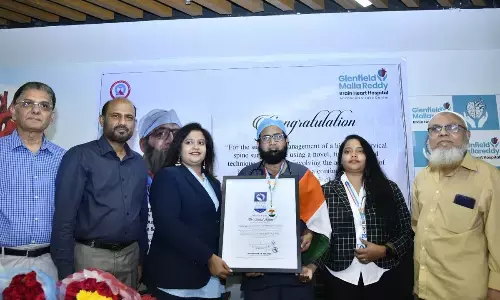New hope for breast cancer patients

According to GLOBOCAN 2018, breast cancer is the most frequently diagnosed cancer and is a common cause of cancer-related death in women in India. Mortality rates are influenced by the occurrence of the disease and the availability of screening programmes and appropriate treatment.
According to GLOBOCAN 2018, breast cancer is the most frequently diagnosed cancer and is a common cause of cancer-related death in women in India. Mortality rates are influenced by the occurrence of the disease and the availability of screening programmes and appropriate treatment.
Despite lower breast cancer incidence, breast cancer mortality rates are higher in many low income countries because of later stage at diagnosis, suboptimal access to treatment, more aggressive biological subtypes, and younger age at diagnosis. Advanced breast cancer is an area where the existing drugs are not improving longevity or quality of life of patients.
Thus, extensive drug research has focused on this niche area in the past few years and newer targets have come into light. Discussed here are some of the newer therapies that have shown promise for treatment of advanced and metastatic breast cancer.
Targeted Therapy
Targeted therapies target the cancer's specific genes, proteins, or the tissue environment that contributes to cancer growth and survival. When it comes to breast cancers some subtypes have too much of a protein called human epidermal growth factor receptor 2 (HER2, pronounced her-too). This protein makes tumour cells grow. The Drug 'Trastuzumab' is an example of targeted therapy and acts by disabling HER2 receptor on breast cancer cell.
Cancer Vaccines
Cancer cells produce proteins and cells that are capable of eliciting an immune response. These cells are engineered in to vaccines to elicit an immune response against tumour-specific or tumor-associated antigens. Thus, the immune system is enabled to attack cancer cells bearing these antigens.
Adoptive Cell Therapy
Adoptive cell therapy takes a patient's own immune cells, modifies them, and then reintroduces them to the patient, where they can seek out and eliminate cancer cells. In CAR T cell therapy, T cells are modified and equipped with chimeric antigen receptors (CARs) that enable superior anti-cancer activity. Chemotherapy and endocrine therapy are still the basic treatments, although optimization of dosage remains an unmet need.
Depending on the receptor status, patients' demand and physicians preference the drug therapy for advanced and metastatic breast cancer varies from patient to patient. For breast cancer when conventional treatments fail, alternative modes of treatment can be helpful to prolong life, especially when combined with chemotherapy. None the less, these therapies are a "New Hope for Breast Cancer Patients!" (Writer is Director, MedicalOncology, Max Super Speciality Hospital, Vaishali)
By Dr Meenu Walia

















